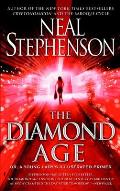by Neal Stephenson
 First published in 1995, Diamond Age is set in late(?) twenty-first century Shanghai and a world revolutionized by nanotechnology. It is the story of the Young Lady's Illustrated Primer, a book-shaped interactive educational device commissioned by an equity lord for his granddaughter, and what happens when an illicit copy falls into the wrong hands.
First published in 1995, Diamond Age is set in late(?) twenty-first century Shanghai and a world revolutionized by nanotechnology. It is the story of the Young Lady's Illustrated Primer, a book-shaped interactive educational device commissioned by an equity lord for his granddaughter, and what happens when an illicit copy falls into the wrong hands.So, I finished Diamond Age last night. It was not a quick read for me (I first posted about reading it on June 29) and I feel like I've been reading it for ages.
I really wanted to like Diamond Age, but I really can't say that I enjoyed reading the novel. Part of that may be because of the genre. I admit that I have a hard time science fiction and I tend to want to skim through sections that I find particularly opaque. But, at 455 pages Diamond Age really is overlong and the second half isn't nearly as good as the first (and the ending is unforgivably rushed).
I was intrigued by the Neo-Victorian sect and some of the technology depicted (the Primer, smart paper, chevalines), but was disappointed in the choices made by Stephenson. For me, the novel had so much unrealized potential. More than that, I wanted more detail on the things the author mentioned in passing and less detail on the things on which he focused.
Russell's planning to read Diamond Age so there may be a follow-up post after he's tackled the novel.
I'll end this post with a snippet of one of Nell's lessons with the constable:
the difference between ignorant and educated people is that the latter know more facts. But that has nothing to do with whether they are stupid or intelligent. The difference between stupid and intelligent people--and this is true whether or not they are well-educated--is that intelligent people can handle subtlety. They are not baffled by ambiguous or even contradictory situations--in fact, they expect them and are apt to become suspicious when things seem overly straightforward. (256)

No comments:
Post a Comment